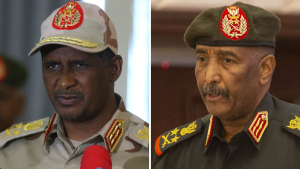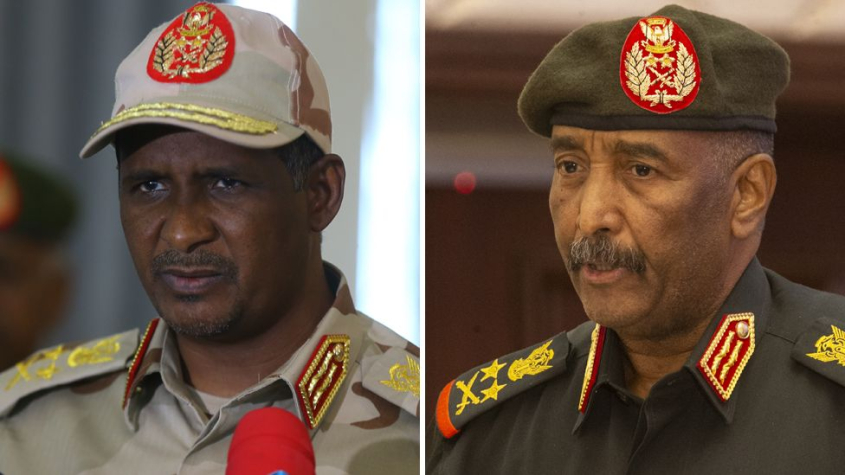OP-ED | Why Sudan’s conflict threatens AfCFTA prospects, By Tanatsiwa Dambuza
Sudan, one of the signatories of the African Continental Free Trade Area (AfCFTA) Agreement, is facing a violent conflict that could jeopardize its participation in the ambitious trade pact.

Trade under the AfCFTA was launched on January 1, 2021, aimed at creating a single market for goods and services for the continent’s population of 1.3 billion people with a combined GDP of $3.4 trillion. Thus far, 54 out of the 55 African Union Member States have signed the AfCFTA while 47 have ratified their instruments of the AfCFTA agreement, just as 46 countries have deposited their instruments of ratification with the AU. As at May 2023, only seven signatories, including Sudan, are yet to ratify the AfCFTA and only Eritrea is yet to sign it.
Sudan signed the AfCFTA Agreement on March 21, 2018. According to the AfCFTA Secretariat, Sudan has a potential market size of $117 billion and a trade potential of $16 billion under the Agreement. However, since April 2023, Sudan has been engulfed in a bloody conflict between rival factions of its military government which seized power in a coup d’état back in October 2021. The fighting erupted mainly in the capital Khartoum and the Darfur region, leaving more than 420 people dead and more than 3,700 injured as at April 23.
The major actors in the conflict are the Sudanese Armed Forces (SAF), led by General Abdel Fattah al-Burhan and the Rapid Support Forces (RSF), led by his deputy-turned-rival General Mohamed Hamdan Dagalo, also known as Hemedti. While the RSF is a paramilitary group that evolved from the notorious Janjaweed militia that committed atrocities in Darfur under former president Omar al-Bashir who was ousted in 2019 after months of popular protests.
The main bone of contention between the two sides is the proposed integration of the RSF into the regular army, which would entail SAF sharing power and control over the country’s security forces with RSF. The conflict has raised fears of a civil war that could destabilize not only Sudan but the entire region. UN Secretary-General Antonio Guterres has warned the violence “could engulf the whole region and beyond” and called for an immediate ceasefire and dialogue.
The conflict has also disrupted Sudan’s economy, which was already struggling with high inflation, shortages of basic goods and services, and a heavy debt burden. The country’s main airport in Khartoum has since April 17 been closed due to security reasons, affecting trade and humanitarian operations. Doubtlessly, the conflict poses a serious challenge to Sudan’s participation in the AfCFTA, which requires political stability, security and infrastructure to facilitate movement of goods and services across borders.
In its draft national AfCFTA implementation strategy, reviewed and validated by stakeholders in February 2022, Sudan identified several priority sectors under the agreement, namely agriculture, livestock, industry and services. The strategy also highlighted some of the challenges and opportunities for Sudan under the AfCFTA, namely enhancing its competitiveness and diversifying its exports by adding value to its raw materials and developing new products and markets; improving its trade facilitation and infrastructure by upgrading its roads, railways, ports and customs procedures.
Others are addressing Sudan’s non-tariff barriers such as standards, regulations and quality control measures; increasing its intra-African trade by taking advantage of its geographical location and existing regional integration arrangements with intergovernmental entities such as the Intergovernmental Authority on Development (IGAD) and the Common Market for Eastern and Southern Africa (COMESA); as well as leveraging its human capital and natural resources by investing in education, skills development and innovation.
Yet, these ambitious objectives could be derailed by the ongoing conflict, which threatens to undermine not only Sudan’s security and stability but also its development prospects. Of course, Sudan is not the only African country facing security challenges that could hamper their participation in the AfCFTA. Others such as Ethiopia, Mali, Nigeria and Somalia are also dealing with internal conflicts or terrorist threats that pose risks to their capacity to effectively participate in the landmark FTA.
In this direction, experts have warned that peace and security are essential prerequisites for the success of the AfCFTA, which aims to boost intra-African trade from its current low level of about 17% to more than 50% by 2030.They have urged African leaders to address the root causes of conflicts such as poverty, inequality, corruption and bad governance as well as promote dialogue, cooperation and integration among African countries. The AfCFTA is a historic opportunity for Africa to achieve its seemingly elusive economic transformation and development goals.
Nonetheless, this also requires political will, commitment and action from all stakeholders to overcome the challenges threatening the AfCFTA and seize the opportunities that the Agreement offers. No doubt, Sudan has a chance to be part of this historic process – only if it is able to resolve its internal conflicts and restore peace and stability! Otherwise, it risks missing out on the immense benefits of the AfCFTA and falling further behind in its development aspirations.
Tanatsiwa Dambuza is co-founder of the Zimbabwe Institute of African Integration. The views expressed in the opinion article are those of the author and do not necessarily represent the editorial policy of African Newspage













